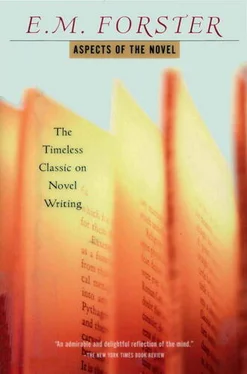She paused and then spoke hurriedly in a louder pleading tone.
"But I thought perhaps it wouldn't die—there might somebody find it. I didn't kill it—I didn't kill it myself. I put it down there and covered it up, and when I came back it was gone. . . . I don't know what I felt until I found that the baby was gone. And when I put it there, I thought I should like somebody to find it and save it from dying, but when I saw it was gone, I was struck like a stone, with fear. I never thought o' stirring, I felt so weak. I knew I couldn't run away, and everybody as saw me 'ud know about the baby. My heart went like stone; I couldn't wish or try for anything; it seemed like as if I should stay there for ever, and nothing 'ud ever change. But they came and took me away."
Hetty was silent, but she shuddered again, as if there was still something behind: and Dinah waited, for her heart was so full that tears must come before words. At last Hetty burst out with a sob.
"Dinah, do you think God will take away that crying and the place in the wood, now I've told everything?" "Let us pray, poor sinner: let us fall on our knees again, and pray to the God of all mercy."
I have not done justice to this scene, because I have had to cut it, and it is on her massiveness that George Eliot depends—she has no nicety of style. The scene is sincere, solid, pathetic, and penetrated with Christianity. The god whom Dinah summons is a living force to the authoress also: he is not brought in to work up the reader's feelings; he is the natural accompaniment of human error and suffering.
Now contrast with it the following scene from The Brothers Karamazov (Mitya is being accused of the murder of his father, of which he is indeed spiritually though not technically guilty).
They proceeded to a final revision of the protocol. Mitya got up, moved from his chair to the corner by the curtain, lay down on a large chest covered by a rug, and instantly fell asleep.
He had a strange dream, utterly out of keeping with the place and the time.
He was driving somewhere in the steppes, where he had been stationed long ago, and a peasant was driving him in a cart with a pair of horses, through snow and sleet. Not far off was a village; he could see the black huts, and half the huts were burned down, there were only the charred beams sticking up. And as they drove in, there were peasant women drawn up along the road, a lot of women, a whole row, all thin and wan, with their faces a sort of brownish colour, especially one at the edge, a tall bony woman, who looked forty, but might have been only twenty, with a long thin face. And in her arms was a little baby crying. And her breasts seemed so dried up that there was not a drop of milk in them. And the child cried and cried, and held out its little bare arms, with its little fists blue from cold.
"Why are they crying? Why are they crying?" Mitya asked as they dashed gaily by. "It's the babe," answered the driver. "The babe weeping."
And Mitya was struck by his saying, in his peasant way, "the babe," and he liked the peasant calling it "the babe." There seemed more pity in it.
"But why is it weeping?" Mitya persisted stupidly. "Why are its little arms bare? Why don't they wrap it up?"
"Why they're poor people, burnt out. They've no bread. They're begging because they've been burnt out."
"No, no," Mitya, as it were, still did not understand. "Tell me, why is it those poor mothers stand there? Why are people poor? Why is the babe poor? Why is the steppe barren? Why don't they hug each other and kiss? Why don't they sing songs of joy? Why are they so dark from black misery? Why don't they feed the babe?"
And he felt that, though his questions were unreasonable and senseless, yet he wanted to ask just that, and he had to ask it just in that way. And he felt that a passion of pity, such as he had never known before, was rising in his heart, that he wanted to cry, that he wanted to do something for them all, so that the babe should weep no more, so that the dark-faced dried-up mother should not weep, that no one should shed tears again from that moment, and he wanted to do it at once, at once, regardless of all obstacles, with all the recklessness of the Karamazovs. . . . And his heart glowed, and he struggled forward towards the light, and he longed to live, to go on and on, towards the new beckoning light, and to hasten, hasten, now, at once!
"What! Where?" he exclaimed, opening his eyes, and sitting up on the chest, as though he had revived from a swoon, smiling brightly. Nikolay Parfenovitch was standing over him, suggesting that he should hear the protocol read aloud and sign it. Mitya guessed that he had been asleep an hour or more, but he did not hear Nikolay Parfenovitch. He was suddenly struck by the fact that there was a pillow under his head, which hadn't been there when he leant back exhausted, on the chest.
"Who put that pillow under my head? Who was so kind?" he cried, with a sort of ecstatic gratitude, and tears in his voice, as though some great kindness had been shown him.
He never found out who this kind man was, perhaps one of the peasant witnesses, or Nikolay Parfenovitch's little secretary had compassionately thought to put a pillow under his head, but his whole soul was quivering with tears. He went to the table and said he would sign whatever they liked.
"I've had a good dream, gentlemen," he said in a strange voice, with a new light, as of joy, in his face.
Now what is the difference in these passages— a difference that throbs in every phrase? It is that the first writer is a preacher, and the second a prophet. George Eliot talks about God, but never alters her focus; God and the tables and chairs are all in the same plane, and in consequence wehave not for a moment the feeling that the whole universe needs pity and love—they are only needed in Hetty's cell. In Dostoevsky the characters and situations always stand for more than themselves; infinity attends them; though yet they remain individuals they expand to embrace it and summon it to embrace them; one can apply to them the saying of St. Catherine of Siena that God is in the soul and the soul is in God as the sea is in the fish and the fish is in the sea. Every sentence he writes implies this extension, and the implication is the dominant aspect of his work. He is a great novelist in the ordinary sense—that is to say his characters have relation to ordinary life and also live in their own surroundings, there are incidents which keep us excited, and so on; he has also the greatness of a prophet, to which our ordinary standards are inapplicable.
That is the gulf between Hetty and Mitya, though they inhabit the same moral and mythological worlds. Hetty, taken by herself, is quite adequate. She is a poor girl, brought to confess her crime, and so to a better frame of mind. But Mitya, taken by himself, is not adequate. He only becomes real through what he implies, his mind is not in a frame at all. Taken by himself he seems distorted out of drawing, intermittent; we begin explaining him away and saying he was disproportionately grateful for the pillow because he was overwrought—very like a Russian in fact. We cannot understand him until we see that he extends, and that the part of him on which Dostoevsky focused did not lie on that wooden chest or even in dreamland but in a region where it could be joined by the rest of humanity. Mitya is—all of us. So is Alyosha, so is Smerdyakov. He is the prophetic vision, and the novelist's creation also. He does not become all of us here: he is Mitya here as Hetty is Hetty. The extension, the melting, the unity through love and pity occur in a region which can only be implied and to which fiction is perhaps the wrong approach. The world of the Karamazovs and Myshkin and Raskolnikov, the world of Moby Dick which we shall enter shortly, it is not a veil, it is not an allegory. It is the ordinary world of fiction, but it reaches back. And that tiny humorous figure of Lady Bertram whom we considered some time ago—Lady Bertram sitting on her sofa with pug—may assist us in these deeper matters. Lady Bertram, we decided, was a flat character, capable of extending into a round when the action required it. Mitya is a round character, but he is capable of extension. He does not conceal anything (mysticism), he does not mean anything (symbolism), he is merely Dmitri Karamazov, but to be merely a person in Dostoevsky is to join up with all the other people far back. Consequently the tremendous current suddenly flows—for me in those closing words: "I've had a good dream, gentlemen." Have I had that good dream too? No, Dostoevsky's characters ask us to share something deeper than their experiences. They convey to us a sensation that is partly physical—the sensation of sinking into a translucent globe and seeing our experience floating far above us on its surface, tiny, remote, yet ours. We have not ceased to be people, we have given nothing up, but "the sea is in the fish and the fish is in the sea."
Читать дальше












